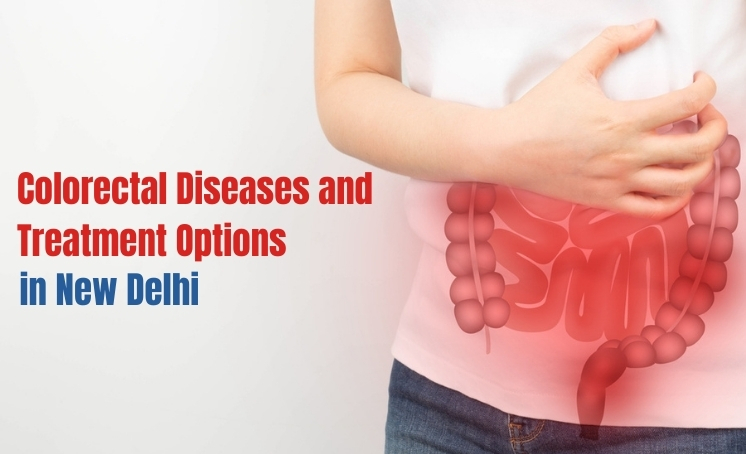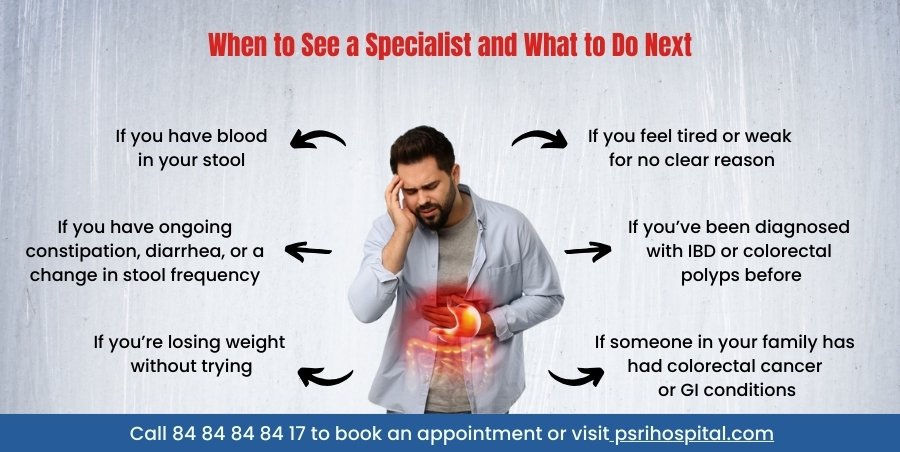All you need to know about Colorectal Diseases and their Treatments

Sometimes a stomach issue or change in your bowel habits feel easy to ignore. But if symptoms like blood in the stool or stomach pain keep coming back, it could be a sign of something more serious.
At PSRI Hospital in South Delhi, patients trust our digestive care team to find the cause and guide them toward the right treatment. Early care can make all the difference whether it’s a minor concern or a more advanced condition.
Lets understand the common symptoms of colorectal diseases, the treatment options you should be aware of, and the cost of colorectal surgery in India to help you make an informed decision.
What Are Colorectal Diseases?
Colorectal diseases affect the lower part of your digestive system, including the colon, rectum, and anus. These organs help store and pass stool.
Common Colorectal Conditions You Should Know:
- Piles, fissures and infections are some of the most common issues.
- Colorectal cancer and inflammatory bowel disease (IBD) are more serious.
- IBD includes conditions like Crohn’s disease and ulcerative colitis.
- Some people may have diverticulitis or benign polyps in the colon.
- Irritable bowel syndrome (IBS) causes discomfort but isn’t life-threatening.
- These problems often begin with mild symptoms and can worsen over time.
- The colon plays a key role in digestion and removing waste from the body.
- If left untreated, some of these issues can affect your overall health.
- Getting the right diagnosis early can lead to better treatment and relief.
Signs You Shouldn’t Ignore
Colorectal diseases often begin with mild symptoms, but some may point to a more serious problem if they continue.
Symptoms of Colorectal Diseases You Shouldn’t Ignore:
- Blood in your stool, either bright red or dark.
- Bloating or a constant feeling of fullness.
- Frequent stomach pain or cramps.
- Sudden changes in bowel habits.
- Diarrhea or constipation lasting more than a week.
- A feeling that your bowel doesn’t empty fully.
- Mucus in the stool.
- Unexplained weight loss or reduced appetite.
- Weakness or tiredness, possibly from hidden blood loss.
- A lump or swelling around the anus.
If you notice any of these symptoms, especially if they don’t go away, it’s important to consult a gastroenterologist or colorectal specialist as soon as possible.
Common Tests Used to Diagnose Colorectal Diseases
If you are experiencing any of the above symptoms, your doctor may recommend a few tests to find the exact cause. Finding the problem early often leads to better treatment and faster recovery.

Tests You May Need:
- Colonoscopy – A flexible tube with a camera is used to check the inside of your colon and rectum.
- Sigmoidoscopy – Similar to colonoscopy but focuses on the lower part of the colon.
- Fecal occult blood test – Checks for small amounts of hidden blood in your stool.
- Stool DNA test – Looks for abnormal DNA linked to colorectal cancer.
- CT scan or MRI – Helps detect inflammation, tumors or structural changes in the bowel.
- Blood tests – Can show signs of anemia, infection or raised markers.
- Biopsy – If needed a small tissue sample is taken for lab testing.
At PSRI Hospital, known as the best hospital in New Delhi, all these tests are available under one roof. Our experienced gastroenterologists explain each step and help you feel at ease. If surgery is needed, you’ll be referred to a colorectal specialist for further care.
Treatment Options for Colorectal Diseases
Treatment depends on your diagnosis. Some conditions improve with lifestyle changes or medicines. Others may need surgery, especially if symptoms don’t get better over time.
Non-Surgical Treatments include:
- Eating more fiber, staying active and drinking plenty of water.
- Medicines to reduce inflammation, fight infection or ease discomfort.
- Antibiotics for infections like diverticulitis.
- Biologic therapy for conditions like Crohn’s disease and ulcerative colitis.
- Pain relief and stool softeners for piles, fissures or constipation.
- Regular check-ups for mild IBS or small polyps.
When Surgery Is Needed:
- When symptoms continue despite treatment.
- If cancer is suspected or already diagnosed.
- In severe cases of IBD or bowel blockage.
- For conditions like rectal prolapse or fistulas.
Common Colorectal Surgeries include:
- Polypectomy: Removal of polyps during a colonoscopy.
- Laparoscopic colectomy: Removing part of the colon using small cuts.
- Open colectomy: Traditional surgery for complex cases.
- Hemorrhoidectomy: Surgery to remove painful or recurring piles.
- Fistula and fissure surgeries: for long-term relief.
- Cancer-related surgery – Sometimes followed by chemo or radiation.
At PSRI Hospital, our specialists perform advanced colorectal surgeries using minimally invasive methods whenever possible. These procedures often mean less pain, quicker recovery, and better outcomes.
Cost of Colorectal Surgery in India
At PSRI Hospital, the cost of surgery depends on your condition, test results, and the treatment advised by your doctor. We provide clear cost estimates in advance, so you always know what to expect. There are no hidden charges, just honest and expert care.
Estimated Price Range:
- ₹75,000 to ₹2,05,000 for most colorectal surgeries.
- Laparoscopic surgery may cost more than traditional open surgery but helps you recover faster.
- Colorectal cancer surgeries may include extra charges for chemotherapy, radiation, or follow-up treatment.
- Colostomy procedures range between ₹47,000 and ₹69,000.
- Hemorrhoidectomy for piles may cost between ₹15,700 and ₹47,000.
These costs usually include the surgery, hospital stay, doctor consultations, medicines, and ICU care if required.
What can affect the final cost:
- Type of surgery – Simple procedures like polyp removal cost less than colon or cancer-related surgeries.
- Surgical method – Laparoscopic surgery usually costs more but offers quicker recovery.
- Pre-surgery tests – May include colonoscopy, blood tests, or imaging scans.
- Room type and stay – Costs vary based on general, semi-private, or private room selection.
- Recovery needs – Some patients may need a special diet, extra medicines, or physiotherapy.
- International patients – Surgery packages can include hospital stay, follow-up care, and support services.
Insurance and Support:
- PSRI Hospital is NABH accredited and part of the cashless treatment network with many health insurance providers in India.
- If you have insurance, your coverage can be pre-approved through your Third Party Administrator.
- Our billing team will help with all documents, approvals, and claims, so you don’t have to worry about the process.
Why PSRI Hospital Is a Trusted Choice for Colorectal Care
With more than 25 years of experience in digestive health, PSRI Hospital is one of India’s most trusted centers for colorectal treatment. Every year, thousands of patients choose us for our advanced care and reliable results.
Why Patients Choose PSRI:
- Over 25 Years of Experience in GI Care: Established in 1996, PSRI was among the first super-specialty institutes in South Asia dedicated to gastroenterology and liver care.
- Highly Experienced Team: Our doctors include senior gastroenterologists, laparoscopic surgeons, and colorectal experts, many with over 20 years of clinical experience.
- Advanced Infrastructure: The hospital has over 200 beds, fully equipped ICUs, advanced operating rooms, and a dedicated Center for Colorectal Diseases.
- Modern Laparoscopic & Day-Care Surgery Unit: We offer laparoscopic and day-care procedures that help patients recover faster and reduce hospital stay by up to 40%.
- Complete Care in One Place: From diagnosis to surgery and recovery, everything is available under one roof saving time and reducing stress.
- NABH and NABL Accredited: PSRI is NABH and NABL accredited, meeting top national standards for safety and medical accuracy.
- Trusted by Local and International Patients: People from Delhi NCR, other states, and abroad trust us for timely and expert digestive care.
Don’t Delay the Care You Need
If you are seeing blood in your stool, continuous stomach ache, or changes in your bowel habits, don’t wait. These symptoms can point to serious colorectal problems that are easier to treat when found early.
At PSRI Hospital, the best hospital in Delhi, our expert team is here to assess your symptoms, perform the right tests, and recommend the best and effective treatment.
Book Your Appointment Today: Call: 84 84 84 84 17
- Visit: www.psrihospital.com
FAQ’s
Q1. Can lifestyle changes help prevent colorectal diseases?
Ans. Yes, healthy habits like eating more fiber, staying active, and avoiding smoking or alcohol can significantly lower your risk.
Q2. What does recovery look like after laparoscopic colorectal surgery?
Ans. Most patients are discharged within a few days and can resume normal activities in about 2 to 3 weeks.
Q3. When is surgery necessary for inflammatory bowel diseases like ulcerative colitis?
Ans. Surgery is usually considered when medications stop working or when complications like repeated flare-ups occur.
Q4. What are common risks of colectomy (colon removal surgery)?
Ans. Risks may include infection, bleeding, or leakage from where the bowel is reconnected.
Q5. What is low anterior resection syndrome after rectal surgery?
Ans. It refers to bowel control issues such as urgency, incomplete emptying, or occasional leakage after rectal surgery.

 Book An Appointment
Book An Appointment Virtual Consultation
Virtual Consultation





